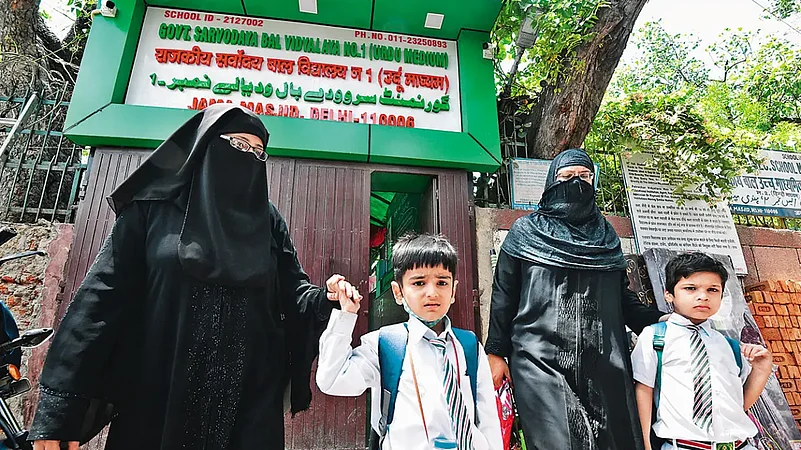A week ahead of Eid, Delhi’s Urdu Bazaar at night wears a look of hurried gaiety. Once a bastion of Urdu literature and books, the Mughal-era book market now houses just a smattering of Urdu book stores, struggling for visibility amid flourishing stalls selling kababs, ittar, embroidered kalimas and cigarettes.
However, Mohammad Naeem, 57, has no time for any of these as he hurries by. It is nearly 10 pm and he is late to open his library. Hazrat Shah Waliullah Public Library, tucked inside the cobbled streets of Delhi’s walled city, is unlike any other library. It opens between 10pm to 12 am every night and holds over 25,000 books in five languages, a majority of them in Urdu. Some of the manuscripts are hundreds of years old, and have travelled far before landing up in this unique collection. “We’re keeping Urdu education alive in Old Delhi,” says Naeem.
ALSO READ: Let A Language Contend
For the past 30 years, Naeem and his friends—a group of dedicated Urdu lovers and educationists in the walled city—have been running the Delhi Youth Welfare Association to uplift local youth and promote Urdu education. “Not just Urdu studies, we help students study in all languages. Language should never be an obstacle for education,” he says. However, in Delhi, the study of Urdu is in a steady decline due to the woeful neglect of Urdu-medium schools.

“These days, both children and parents prefer English education,” says Ehetram Uddin, physics teacher and head of the Urdu-medium Fatehpuri Muslim Senior Secondary School. Perched on top of the 17th-century Fatehpuri Masjid in Old Delhi, the aided school has been the alma mater of thousands of Muslim youth from the area since its inception in 1929.
Unlike madrasas that teach religious studies, Urdu-medium schools are regular schools where all subjects (except other languages) are supposed to be taught in Urdu. However, many of these Urdu-medium schools today only teach Urdu as a subject. Maths, science and arts are usually taught in English or Hindi. There are about 20-22 Urdu-medium schools under the Delhi education department, and the numbers are dropping. In Delhi as in other states, Urdu-medium schools are being merged with schools that teach in other languages, due to an apparent lack of students.
In the past few years, there has been a declining trend in students coming to Urdu-medium schools, Ehetram tells Outlook. Most of the students who come to aided schools like Fatehpuri, belong to underprivileged families. The Covid-19 lockdown and subsequent economic distress sent many of Ehetram’s young students into manual labour jobs. Of the ones that remained, many want to switch to English. “We had to introduce an English-medium section some years back to retain our students,” he admits.

One of the primary reasons for the decreasing interest in studying in Urdu is the lack of qualified Urdu teachers. Staff at several government-run Urdu schools in Old Delhi allege that Hindi teachers are recruited to Urdu schools, and many of them end up teaching subjects in Hindi. Up until 1995, there was a criterion for teachers in Urdu-medium schools to have studied Urdu till Class XII. That was the year when the last batch of permanent Trained Graduate Teachers (TGTs) and Post Graduate Teachers (PGTs) were recruited in Urdu schools.
While there were some approvals in primary teacher recruitments, the majority of them teach in Hindi and English. In several government schools that Outlook visited, guest teachers, as well as principals, did not speak or teach in Urdu.
In Sarovdaya Kanya Vidyalaya 2, one of the Urdu-medium girl’s schools in Old Delhi, Urdu is taught only as a subject, with Social Studies (SST) the only other subject that is taught in Urdu. The rest of the subjects are taught in Hindi and English. Principal Poonam Meena from Rajasthan, who took charge of the school during the pandemic, is herself not a native Urdu speaker. She recalls that her first recruitment as a teacher was in an Urdu-medium school. “I learnt Urdu on the job and I understand the importance of a qualified teacher for Urdu. India is a diverse country with many languages, and all languages should be promoted,” she says.
The current BJP government at the Centre has pushed a three-language policy under the new National Education Policy (NEP), which aims to promote ‘modern Indian languages’ like Urdu as a third language, along with English and Hindi. But who decides the third language? Delhi government schools offer Punjabi, Sanskrit and Urdu as third language options. But Sanskrit remains the most offered third language in private schools, despite the demand for Urdu and Punjabi in government schools, wherever they are offered. Even among government schools, the number of Urdu language schools is low and concentrated in Muslim-majority areas. Most of them are inadequately staffed.
According to a 2018 report compiled by the Delhi Minority Commission, Urdu was taught as a subject in 284 out of 1,100 government schools in the capital. The report found that out of the total 1,028 sanctioned TGT posts for Urdu language teachers, 883 were lying vacant. In 2021, the Arvind Kejriwal government announced the recruitment of 900 Urdu teachers in TGT posts. At the time, AAP supporters hailed it as the first time in 40 years that recruitments for Urdu teachers were taking place.
Ghayoor Ahmad, vice principal and head of Sarvoday Bal Vidyalaya 1, an Urdu-medium boys school near Gate No. 1, Jama Masjid, clarifies that the move did not benefit Urdu-medium schools as the posts were not for teachers in Urdu-medium schools, but just for Urdu-language instructors. Once recruited, these teachers may not necessarily get placed in Urdu-medium schools, but in other government schools that offer Urdu as a subject.

Schools like SBV 1 cater to about 1,000 students each on average, mostly from local Muslim families. They offer students the option to receive their education in Hindi, or choose bilingual instruction. Ahmad says the number of students in the school has increased. Unlike aided institutions, government-run Urdu schools in the area have better infrastructure and more staff. “The aim is to change the image of dilapidated Urdu-medium schools as places where only Muslim children can study into model schools under the Delhi government,” Ahmad says.
But for aided schools like the 103-year-old Fatehpuri Muslim School, 95 per cent of whose funds come from the government (five per cent is managed by the school’s managing committee), the lack of teachers is a matter of concern. School administrations blame the “departmental hostility” for slow recruitments.
“When teachers retire, we ask the department to open vacancies. In time they do, but they ask us to promote our TGT teachers to PGT first. If these teachers don’t get clearance, the vacancies remain unfilled and pass on to the next cycle,” says Khalil Ahmed, the school’s manager. As of now, there are nine permanent teachers teaching 422 students. “We need at least 20,” Khalil adds.
Despite the push for primary education in mother tongues under the NEP, students studying in Urdu face challenges in competing with English-educated students, and many choose to opt for English in basic or higher education. Data from the National Testing Agency shows that nearly 79 per cent of total NEET 2020 aspirants chose to write the examination in English. Just 0.12 per cent students opt for Urdu.
According to the 75th NSS round of the 2017-18 Household Survey on Education, a majority of Muslim households (53.8 per cent) sent their children to English-speaking schools. About 20.8 per cent families chose Hindi schools, while only 12.2 per cent families opted for Urdu-medium schools.
When asked what the biggest threat to Urdu was—English or Hindi—activists and educationists agreed it was neither. “The biggest threat to any language is its communalisation,” says city-based filmmaker and history buff Sohail Hashmi. “Mahatma Gandhi wanted Hindustani [from which both Hindi and Urdu originate] to be the official language of India. The problem began when politicians started to claim Hindi is the language of Hindus, and Urdu of Muslims. This was the start of Urdu’s othering as something foreign and un-Indian,” Hashmi says.
At a time when communal politics have taken centre stage, communalisation of language and its subsequent neglect may leave a large number of marginalised Muslim students with no access to private education or other languages further in the lurch, Hashmi adds.
“Urdu was born in India. It is as much an Indian language as Hindi. Many of Hindi’s greatest poets have written in Urdu,” says Khail, who is also a patron at the nightly Old Delhi library. The communalisation and erasure of Urdu as a language adds to the othering of minority communities both in society and in their own minds. “If youth from Urdu-speaking households don’t learn to read in Urdu, what will they learn of the literature, heritage, art and culture of their own community? They will be lost in the world with no connection to their roots,” he rues.
Tabassum, 32, is a single mother whose child, Syed, is a student at one of the government-run Urdu schools of the walled city. Having learnt Urdu from her father, who was a teacher, she wants her son to get at least his basic education in Urdu. “But he wants to study in the English medium. He says he will not get a job if he studies in Urdu or Hindi,” Tabassum says. She can’t afford to send her son to a private, English-medium school. She tries to get him to read the works of Iqbal and Faiz in Urdu. But he shows little interest.
Last week, CBSE decided to drop the poems of Faiz Ahmad Faiz—among other topics like democracy, diversity and Mughal courts—from the school syllabus. Tabassum fears that if her son shifts to an English-medium school, all the great poetry of protest, Urdu literary traditions and the grandeur of Mughal history that forms the cultural backbone of Old Delhi—her home—might be lost to him forever. “I hope he studies it now, while he still can. Who knows, they might drop the language itself from the country’s syllabus one day.”
(This appeared in the print edition as "A Dying Declaration")
ALSO READ






















